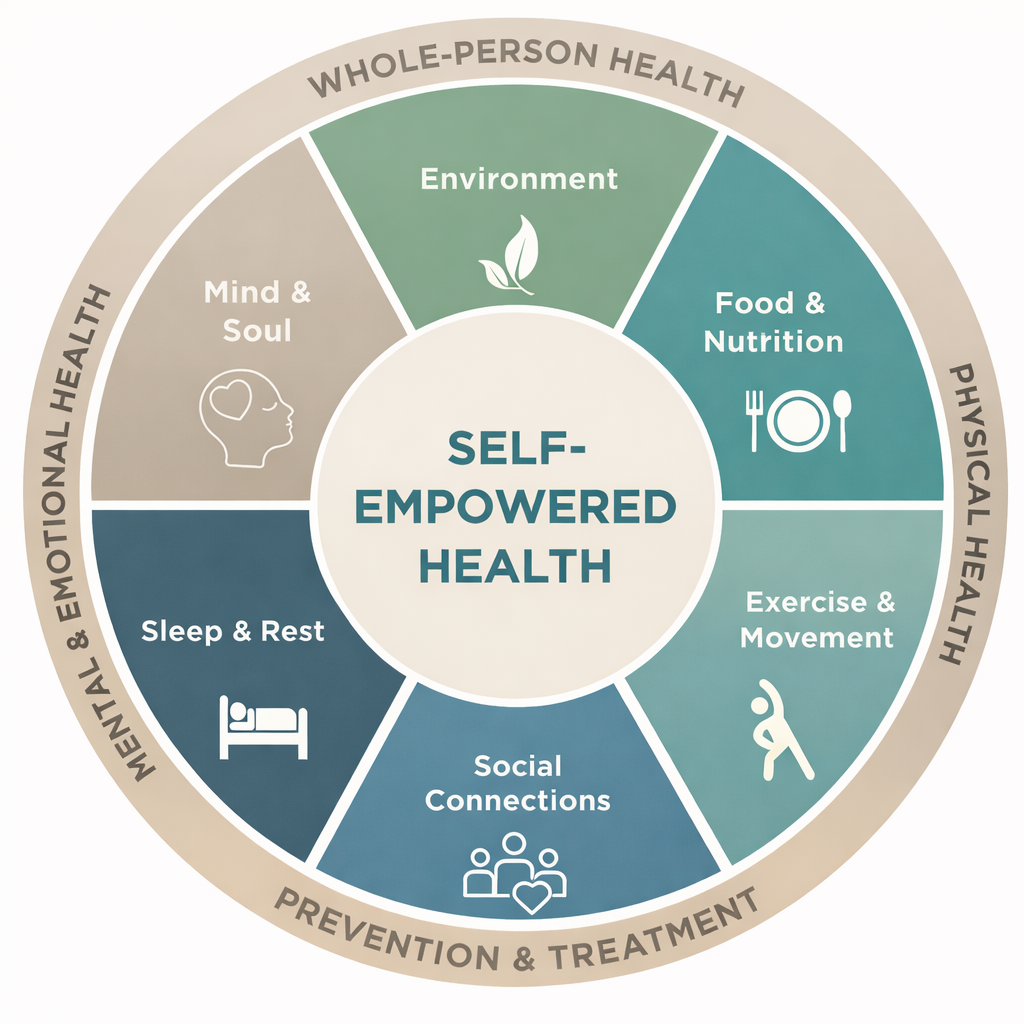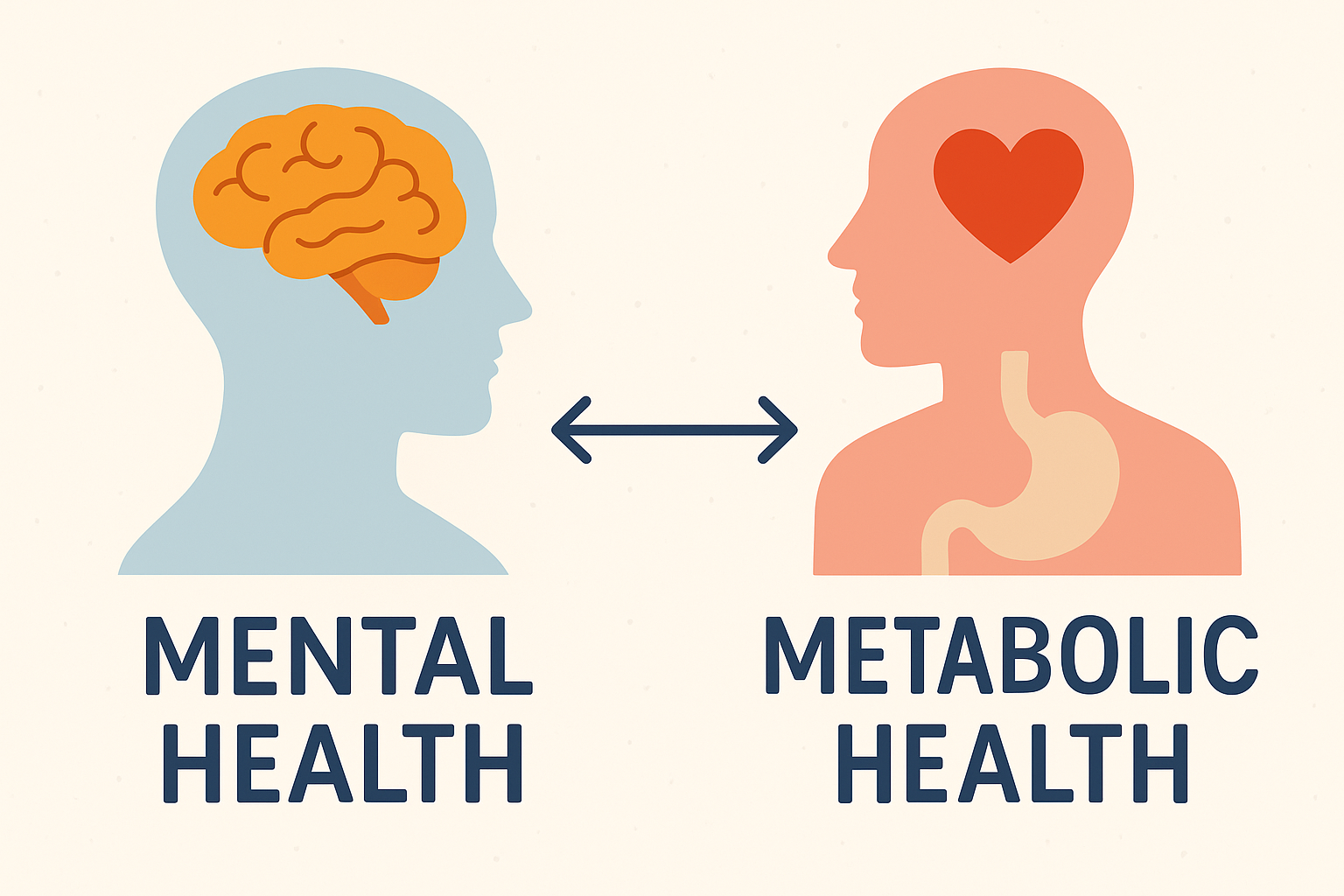Perimenopause, Hormones, and Mood: How Diet and Lifestyle Can Restore Balance
Are you finding yourself in your mid to late 40’s and noticing changes in mood, sleep, cycle, and weight? This period (Pun intended) catches us all by surpirse, and yet it is a critical time to focus on health for a smooth transition.
Perimenopause is a dynamic neurological and metabolic transition. During this phase, hormones fluctuate unpredictably rather than steadily decreasing, and these shifts can profoundly affect mood, cognition, sleep, and emotional regulation.
Many women describe feeling “not like themselves,” experiencing anxiety, irritability, low motivation, brain fog, or sudden waves of sadness. These changes are not imagined. They reflect the powerful interaction between hormones, the brain, inflammation, and the nervous system.
Understanding how hormones fluctuate — and how to support them through nutrition and lifestyle — can transform perimenopause from a destabilizing experience into a deeply regulating and empowering transition.
The Monthly Hormone Rhythm — Even in Perimenopause
Although cycles may become irregular, many women still experience hormonal patterns across the month. What changes is the intensity and unpredictability of hormone surges and drops, especially estrogen and progesterone.
Estrogen: The Amplifier
Estrogen is often associated with vitality, focus, and emotional openness.
When estrogen rises:
Mood and motivation often improve
Verbal fluency and creativity increase
Serotonin and dopamine activity are enhanced
When estrogen fluctuates rapidly:
Anxiety can increase
Sensory sensitivity may rise
Emotional reactivity may feel stronger
Estrogen supports serotonin signaling and brain glucose metabolism. Sudden drops — which are common in perimenopause — can feel like an emotional “crash,” leading to irritability or low mood.
Progesterone: The Nervous System Regulator
Progesterone is sometimes called the body’s natural calming hormone. It enhances GABA activity in the brain, helping promote relaxation and sleep.
When progesterone is adequate:
Nervous system regulation improves
Sleep quality tends to be better
Emotional resilience increases
When progesterone declines (common in perimenopause):
Women may feel wired but exhausted
Sleep disruptions increase
Anxiety or overwhelm can intensify
Because ovulation becomes less consistent in perimenopause, progesterone often drops earlier than estrogen — creating a state of relative estrogen dominance, which can heighten mood swings.
Testosterone: Motivation and Drive
Though often overlooked, testosterone plays a role in energy, confidence, and mental clarity.
Balanced levels may support:
Assertiveness and motivation
Libido
Physical vitality
Lower levels may contribute to:
Fatigue
Reduced confidence
Brain fog
Cortisol: The Stress Hormone That Interacts With All Others
Cortisol is not a reproductive hormone, but it strongly influences hormonal balance. Chronic stress disrupts the hypothalamic-pituitary-adrenal (HPA) axis, which communicates directly with the reproductive system.
When cortisol remains elevated:
Progesterone may be “stolen” to produce stress hormones
Blood sugar instability increases mood volatility
Sleep disturbances worsen hormonal imbalance
Supporting cortisol regulation is often the missing piece in stabilizing mood during perimenopause.
Why Mood Feels Less Stable During Perimenopause
Hormones are deeply intertwined with neurotransmitters and inflammation.
Fluctuating estrogen affects:
Serotonin (mood stability)
Dopamine (motivation)
Acetylcholine (focus and memory)
Meanwhile, shifts in metabolism, insulin sensitivity, and gut health can increase neuroinflammation — amplifying emotional reactivity.
From an integrative perspective, perimenopause is not just hormonal; it is a neuroendocrine and metabolic recalibration.
Diet Strategies to Support Hormonal Mood Stability
Nutrition can act as a powerful stabilizer by supporting blood sugar balance, reducing inflammation, and supporting neurotransmitter production.
1. Prioritize Blood Sugar Regulation
Stable glucose levels help prevent mood swings and cortisol spikes.
Focus on:
Protein at every meal
Fiber-rich vegetables
Healthy fats (olive oil, avocado, nuts)
Minimizing refined sugar and processed carbohydrates
Blood sugar swings often mimic hormonal anxiety — stabilizing meals can reduce emotional volatility.
2. Support Estrogen Metabolism
The liver and gut help process estrogen efficiently.
Helpful foods include:
Cruciferous vegetables (broccoli, arugula, cauliflower)
Flaxseed and chia
High-fiber plant foods
These foods support detoxification pathways that prevent estrogen from becoming overly stimulating to the nervous system.
3. Nourish the Brain With Anti-Inflammatory Fats
Omega-3 fatty acids support mood regulation and reduce neuroinflammation.
Consider:
Wild salmon
Sardines
Walnuts
Algae-based omega-3 sources
Inflammation can magnify hormonal mood shifts — reducing it often leads to noticeable emotional steadiness.
4. Support Progesterone Through Minerals and Micronutrients
Magnesium, zinc, and vitamin B6 help regulate neurotransmitters and promote relaxation.
Foods rich in these nutrients include:
Pumpkin seeds
Dark leafy greens
Lentils
Bananas
Lifestyle Practices That Regulate Hormones and Mood
Diet alone is not enough. Hormones respond to nervous system input, sleep, and emotional processing.
Strength Training and Movement
Resistance training improves insulin sensitivity and supports hormonal resilience. Even 2–3 sessions per week can stabilize mood and energy.
Sleep as Hormone Medicine
Deep sleep supports progesterone balance and cortisol regulation. Consistent bedtime routines and reducing evening light exposure can improve sleep architecture.
Nervous System Regulation
Practices like breathwork, mindfulness, or somatic therapies help calm the HPA axis, reducing hormonal volatility.
Emotional Processing and Connection
Perimenopause often coincides with major life transitions. Relational support, therapy, or group work can help integrate emotional shifts rather than suppress them.
Reframing Perimenopause: A Neurobiological Transition, Not a Breakdown
Perimenopause is frequently framed as loss — loss of fertility, youth, or stability. Yet many women emerge from this transition with greater clarity, authenticity, and emotional depth.
When supported through:
nutrient-dense food,
intentional lifestyle rhythms,
and nervous system regulation,
the hormonal fluctuations of perimenopause can become less destabilizing and more transformative.
Rather than fighting the body, the goal becomes working with the intelligence of hormonal cycles — honoring the natural ebb and flow while providing the brain and body the support they need to remain grounded.
Tara Trebesch
Integrative Health & Psychotherapy
Park City, Utah
The Foundations of Self-Empowered Health: A Whole-Person Approach to Mental Well-Being
Mental health is often discussed in purely psychological terms, yet lasting change rarely occurs when we focus on thoughts and emotions alone. A whole-person model recognizes that mental well-being is shaped by biological, environmental, relational, and lifestyle factors that continually influence the brain and nervous system.
The framework illustrated above reflects an integrative perspective on health — one that considers environment, nutrition, movement, sleep, social connection, and inner emotional life as interconnected elements supporting overall mental wellness.
A Whole-Body View of Mental Health
Each area represented within this model plays a meaningful role in emotional and cognitive functioning.
Environment
The nervous system responds continuously to external conditions, including physical surroundings, daily demands, and chronic stress exposure. Supportive environments promote regulation and resilience, while ongoing stressors can contribute to physiological strain and inflammatory processes.
Food and Nutrition
Nutrition influences neurotransmitter production, metabolic health, and gut–brain communication. Balanced blood sugar and nutrient density are increasingly recognized as foundational components of emotional stability and cognitive clarity.
Exercise and Movement
Regular movement supports circulation, regulates stress hormones, and enhances neuroplasticity — the brain’s ability to adapt and recover. Movement practices do not need to be extreme; consistent, intentional activity can significantly support mood regulation and overall well-being.
Social Connections
Healthy relationships play a central role in nervous system regulation. Connection fosters safety, belonging, and emotional processing, while chronic isolation can amplify stress responses and negatively affect mental health outcomes.
Sleep and Rest
Sleep is essential for neurological repair, emotional integration, and metabolic balance. Disruptions in sleep patterns are strongly associated with increased inflammation, impaired insulin signaling, and reduced capacity for emotional regulation.
Mind and Inner Life
Self-awareness, emotional processing, and meaning-making contribute to resilience and psychological growth. Therapeutic work, reflective practices, and mindful awareness help individuals understand deeper patterns that influence behavior and well-being.
Together, these domains illustrate that mental health is not a single pathway but a dynamic system in which each element influences the others.
Inflammation, Insulin Resistance, and Brain Function
An emerging area of integrative mental health research focuses on the role of inflammation in emotional and cognitive functioning. Chronic stress, disrupted sleep, poor nutrition, and environmental strain can contribute to low-grade systemic inflammation that extends beyond the body and into the brain.
Inflammation may influence mental health through several mechanisms:
Altered neurotransmitter activity, affecting mood and motivation
Disruption of insulin signaling in the brain, contributing to insulin resistance
Increased neuroinflammatory responses that can affect focus, memory, and emotional regulation
When insulin signaling becomes impaired, the brain’s ability to efficiently use glucose for energy may decline. This can manifest as fatigue, brain fog, and fluctuations in mood or concentration. While mental health challenges are multifaceted, understanding these biological contributors helps expand the possibilities for effective, integrative care.
A Self-Empowered Approach to Healing
A whole-person framework does not aim for perfection; rather, it emphasizes awareness and sustainable change. Small, intentional shifts across multiple areas of life can create meaningful improvements in mental health:
Supporting metabolic balance through nutrition
Prioritizing restorative sleep
Strengthening social connection and relational safety
Addressing underlying emotional patterns through psychotherapy
Cultivating environments that promote calm and stability
When these elements begin to align, individuals often experience greater clarity, resilience, and a renewed sense of agency in their well-being.
Integrating Mind, Body, and Context
Mental health is shaped by the complex interaction between biology, psychology, lifestyle, and environment. By viewing wellness through a whole-person lens, therapy and integrative health practices can move beyond symptom management toward deeper, more sustainable transformation.
This model of self-empowered health reflects a shift toward understanding mental wellness as an integrated process — one that honors the interconnected nature of body, mind, and lived experience.
📍 Tara Trebesch, ACMHC, CN, IHP, CFA
Integrative Health & Psychotherapy
Park City, Utah | taratrebesch.com
The Importance of Counseling in Achieving Long-Term Goals
Setting long-term goals is an empowering step. Whether the goal is related to career growth, personal relationships, health, or emotional well-being, achieving it requires more than willpower. Success often comes from clarity, accountability, and the ability to navigate setbacks along the way. This is where counseling can make a profound difference.
1. Clarity and Direction
Counseling provides a space to sort through competing priorities, limiting beliefs, and distractions. Together, we clarify your vision, break large goals into manageable steps, and align them with your core values. This clarity prevents wasted effort and keeps motivation steady.
2. Identifying Obstacles
Everyone encounters roadblocks when pursuing long-term goals—stress, fear of failure, negative self-talk, or old patterns that resurface under pressure. Counseling helps you recognize these obstacles early and develop practical strategies to move past them.
3. Building Emotional Resilience
Big goals require persistence. Therapy equips you with emotional tools to handle disappointment, self-doubt, and uncertainty without losing sight of the bigger picture. This resilience helps you bounce back quickly and stay committed even when progress feels slow.
4. Accountability and Support
Working with a counselor means having a partner who provides consistent support and accountability. The therapeutic relationship creates a safe environment where you can celebrate successes, honestly assess setbacks, and stay focused on the next step forward.
5. Strengthening Self-Awareness
Counseling fosters deeper self-awareness—helping you uncover motivations, values, and personal strengths. This ensures that long-term goals are not just achieved, but are also meaningful and sustainable.
Take Away
Long-term goals are not simply about reaching an endpoint; they are about becoming the person capable of sustaining that success. Counseling offers the opportunity to examine negative patterns that thwart one’s ability to meet goals, while also providing guidance, structure, and emotional support that transform lofty aspirations into achievable, lasting change.
📍 Tara Trebesch, ACMHC, CN, IHP, CFA
Integrative Health & Psychotherapy
Park City, Utah | taratrebesch.com
The Link Between Mental Health and Metabolic Health
In recent years, science has revealed what many holistic practitioners have long understood: mental health and metabolic health are deeply interconnected. Far from existing in separate systems, the mind and body constantly communicate with one another. When one is out of balance, the other is often affected.
What Is Metabolic Health?
Metabolic health refers to how well the body processes energy and maintains stable blood sugar, blood pressure, cholesterol, and weight. Good metabolic health supports energy, hormonal balance, and resilience against chronic illnesses such as diabetes, heart disease, and obesity.
How Metabolism Affects Mental Health
When the body struggles to regulate blood sugar, inflammation, or hormones, the brain is among the first systems to feel the impact. Some of the most common ways metabolic dysfunction influences mental health include:
Blood sugar fluctuations and Insulin Resistance: Rapid spikes and crashes can trigger mood swings, anxiety, irritability, and brain fog. The brain is run primarily by glucose, and frequent spikes directly affect mental health.
Inflammation: Chronic low-grade inflammation, often linked to poor diet or stress, is associated with depression and cognitive decline.
Hormonal imbalances: Insulin resistance, thyroid dysfunction, and cortisol dysregulation can increase vulnerability to anxiety, depression, and fatigue.
How Mental Health Affects Metabolism
The connection runs both ways. Mental and emotional stress can directly influence metabolic health:
Stress and cortisol: Chronic stress raises cortisol, which can disrupt sleep, increase cravings for sugar and refined carbs, and promote weight gain. This can affect the Hypothalamic–Pituitary–Adrenal axis (HPA axis) and is directly linked to adrenal, thyroid, and sex hormone imbalances.
Emotional eating: Anxiety and depression may lead to using food for comfort, which can undermine metabolic balance.
Sleep disruption: Poor sleep, often linked to mental health struggles, impairs insulin sensitivity and increases risk for metabolic syndrome.
The Gut-Brain-Metabolism Connection
One of the most fascinating discoveries in this field is the role of the gut-brain axis. The gut microbiome influences both metabolic processes and mood regulation through neurotransmitter production, inflammation pathways, and nutrient absorption. Supporting gut health through nutrition and lifestyle changes can therefore benefit both mind and body.
Building Resilience in Both Systems
The good news is that by addressing one area, you often strengthen the other. Some effective approaches include:
Balanced nutrition: Whole foods, steady blood sugar, and anti-inflammatory choices support both brain function and metabolism.
Mindfulness and stress reduction: Practices like meditation and breathwork regulate cortisol and improve emotional resilience.
Movement: Regular physical activity boosts mood-enhancing neurotransmitters while improving insulin sensitivity and metabolic strength.
Therapy and support: Counseling helps reduce emotional burdens that can drive stress eating, poor sleep, or inconsistent self-care.
What you should remember…
Mental health and metabolic health are two sides of the same coin. When we nurture both, we not only reduce symptoms but create lasting vitality and resilience. Through integrative approaches—blending psychotherapy, nutrition, mindfulness, and body-based interventions—you can create a stronger foundation for both emotional well-being, physical health and longevity.
📍 Tara Trebesch, ACMHC, CN, IHP, CFA
Integrative Health & Psychotherapy
Park City, Utah | taratrebesch.com




